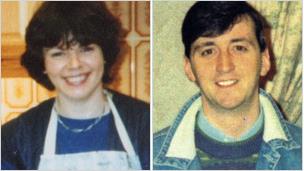Inside the mind of Colin Howell
- Published

The bodies of Lesley Howell and Trevor Buchanan were found in a car in 1991
Lesley Howell, 31, and Trevor Buchanan, 32, were found in a car full of exhaust fumes in Castlerock in 1991.
For nearly 18 years it was wrongly assumed that they had died in a suicide pact.
In March Hazel Stewart was found guilty of murdering her policeman husband, Mr Buchanan and her then lover's wife, Mrs Howell.
Her ex-partner, former Dentist Colin Howell, pleaded guilty to the murders last year.
The court-case centred on a real-life story which involved sex, religion, adultery, murder, cover-up and then - 20 years later - a confession.
In the dock was Hazel Stewart, a former Sunday school teacher. Back in 1991, she was having an affair with the local dentist Colin Howell.
And one night in the summer of 1991, they killed their respective spouses. They did it in such a way as to make it look like two suicides, rather than two murders.
A few weeks after the funerals, Stewart and Howell then continued their secret affair. They kept it going for another five years.
But even when they broke up and married other people, they didn't admit to the murders.
Then, two years ago, out of the blue, Colin Howell confessed to his Church elders, and then to the police, about what they'd done.
For almost 20 years, Colin Howell got away with murder and lived a seemingly happy, normal existence.
Folly a deux
But then two things happened which changed his life. First, his 22-year-old son, Matthew, died in an accident in Russia.
Second, he lost a fortune when a business deal in the Philippines went wrong. One or both of these incidents may have been the trigger for his sudden confession. If he hadn't eventually confessed, the truth would probably never have come out.
Professor of criminology David Wilson explained that this turn of events could have been motivated by selfish reasons.
"Well it's certainly not going to be remorse and its certainly not going to have be guilt, that led him to hand himself in," Mr Wilson said.
"This is a classic case of calculation in terms of 'it would be better to 'fess up' rather than face the circumstances he was currently living in.
"I also think it was intimately bound up with the relationship he had with his new wife, who has since moved back to the US.
"For a very long period of time Colin Howell has been a cunning, manipulative and controlling man and I think you would have to place his desire to bring these murders to the authorities attention within that manipulative context.
"I think there is some criminoloigical background we could use here and in particular one would like to look at this in terms of a folly a deux, the psychological concept, literally meaning a madness shared by two," Mr Wilson added.
"Historically there are some other folly a deux we can look to such as between Ian Brady and Myra Hindley, and again with Fred and Rose West.
"Usually within a folly a deux there is a more dominant male figure who will manipulate a more subservient disciple, or a female figure to share a world view which is frankly unbelievable.
"The strength of Colin Howell was his ability as a fantasist to convince somebody like Hazel Stewart that that world was possible."
This type of behaviour was illustrated by the fact that Colin Howell could be in the garage making a slide for his child whilst devising the pipe he would later use for the murders.
Mr Wilson said this type of behaviour was categorised as compartmentalising.
"It was how he was able to have the very public face, the public rituals of being a businessman, a dentist, a Baptist lay-preacher, whilst all the time the private realities behind those public rituals were ones that could include psychopathy and ultimately murder.
"I think in the end, his confession was probably related to the fact that he was overwhelmed by the amount things he had to compartmentalise."
Throughout the court case of Hazel Stewart members of both families stood in the gallery.
On one side the children of Lesley Howell, wanting to find answers about their mother's death. Sat opposite them were the children of Hazel Stewart, who, despite losing their father, chose to stand by their mother throughout the court case.
Many people were surprised by this but Mr Wilson said it is not unusual.
"Often one finds that the families of murder victims react in a variety of ways, not just a stereotypical way so actually her children standing by her is not that odd at all."
- Published8 March 2011
- Published11 March 2011
- Published18 November 2010
- Published2 March 2011